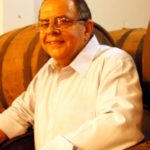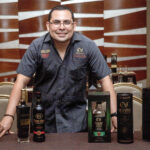Rones de México, Master Blender & COO: JORGE PÉREZ
Rones de Mexico, since 1948, is a family-owned distillery located in Tapachula Chiapas, Mexico. They are producers of the most awarded rums from that country and on this occasion, we had the pleasure of speaking with the Master Blender & COO of Rums from Mexico, Jorge Perez, who has been part of this industry for more than 43 years. Learn more about him, in the next interview:
TRL: Who is Jorge Pérez?
I was born in Havana City, Cuba in November of 1954. I am a Food Technology Engineer and went on to study in Bulgaria a master’s degree in Enology and Fermentation and a Ph.D. in Spirits and Natural Extracts. When I went back to Cuba, I started working in Havana Club, and that is how I was introduced to the world of rum.
The rum industry was already ingrained in me because, when I finished my engineering degree, my thesis consisted in designing a rum factory from scratch. Once I graduated, that’s what I ended up dedicating my life to for more than 43 years now.
I became Production Manager and Chief Operating Officer at Havana Club as well as President of the Scientific Council of Spirits and Biotechnology in Cuba, among other honors. One of my passions has also been the training of professionals in the industry.
In 2002, I moved to Mexico and started working as an adviser to the beverages industry and since 2008 I am Master Blender and COO at Rones de Mexico.
TRL: What does rum mean for you? What made you fall in love with rum and when did it happen?
To me, rum means a living passion, where I see the possibility to conjugate science and art; to design a product which can bring happiness and satisfaction to a consumer is very important to me.
During my beginnings in the rum industry, I acquired great knowledge and had the privilege to collaborate with the great Cuban Master Blender José Navarro, with Carlos Fernández, with Francisco Fernández.
TRL: Three essential characteristics that define rum according to your perspective.
It is one of the spirits with the most identifiable aromatic compounds and organoleptic complexity. Defined by the quality of its raw materials, either molasses or fresh juice; the fermentation and distillation process that results in both neutral alcohol or aguardiente; and the aging and blending stages that I describe as requiring both science and art. A rum must be a product to be remembered for the satisfaction that it brings its consumer.
TRL: What is the most important contribution you have made in the rum industry?
I have dedicated 43 years of my life to the world of rum with passion, dedication, and joy; always aiming for the excellence of the products that I blend. I think that training consumers and professionals in the industry might be one of my favorite contributions. As well as, in the past few years, designing the most awarded rums from Mexico.
TRL: Benefits that the rum industry has given you.
Everything I have and everything I am. Rum is my life.
TRL: What’s another thing you are passionate about, in addition to rum? Why?
Medicine, for humanity’s wellbeing. When I was deciding on my professional degree, I had to choose between medicine and food engineering. I decided on the latter.
TRL: What is your favorite place for drinking rum?
At home, accompanied by my son Jorge, who lives in Cuba.
TRL: Favorite drink + Recipe
I prefer to drink rum with just one ice. If it’s a cocktail, though, my favorite is a Mulata Daiquiri with little sugar.
TRL: Why is it important to educate the rum consumer?
For what I call alcoholic culture. It’s important to educate on the organoleptic characteristics of rum. Rum is so diverse, that we should educate consumers on how to evaluate this spirit, so that they can contemplate, enjoy, and remember the ones they like. To have this habit, also allows us to drink in moderation.
TRL: Any tips to train the palate and taste a good premium rum?
First, try to obtain information about that rum prior to tasting, such as if it’s made with molasses or juice, place of fermentation/distillation, type of wood used for aging and where it takes place and any other relevant information. This allows us to have a better alcoholic culture mentioned above and a first approach to the rum we are tasting.
One should let the rum slide down the walls of the glass to observe the uniformity of the legs. Recognize the harmony between the olfactive and gustative notes and try to connect the olfactive impression with what we expect of the gustative impression. A premium rum should always tell us what we’re about to drink, what our gustative experience will be.
Facing the complexity of not being able to define gustative composition is a great challenge. The consumption of that rum should leave a pleasant aftertaste, to invite us to continue consuming it. Training takes time.
TRL: How can rum contribute to improve the crisis in some countries?
Rum industry is an important part of any country’s economy. It spans the three productive sectors: agricultural (should involve bio-sustainability), industry and services (commerce). It generates jobs and sources of income (direct and indirect jobs, related businesses, taxes) in all three sectors. It should even be promoted.
TRL: Is the commitment to sustainable development the key to success for the permanence of the rum industry in the world? Why?
Yes, it is vital. It should reduce both environmental and social impacts. We mustn’t make rum humanity’s opium. It must bring wellbeing and social development. Striving for excellence in quality and opening to scientific and technological developments. Giving way to scientific and technical advancements should also be a constant. Rum production can also modernize and use new and/or different techniques.
TRL: Who would like to meet in the rum industry? What would you say to him/her?
More so than meeting someone, I’d love to reunite someday with my esteemed colleague Francisco Fernández (Don Pancho) and invite Jassil Villanueva to this encounter, to share our mutual love for rum.
TRL: What are your next goals in the rum industry?
Keep working so that rums from Mexico are recognized worldwide as great rums and sharing my knowledge and experience with new generations.
TRL: Why is the role of the bartender important in the rum industry?
It is pivotal. It is sometimes the first approximation of consumers to rum. They are storytellers, they can engage the consumers into all the fascinating stories about rum, its tradition, and its future. They are the first educators in rum. And naturally, through cocktails, they can make the experience of drinking rum even more pleasurable, considering not all consumers drink rum neatly.
TRL: What is your advice for new generations in the rum industry?
Respect the rum traditions of each country, continuing to strive for excellence in rum-making and flooding the market with premium-quality rums which are accessible to consumers. And don’t forget, educate the consumer!
http://ronesdemexico.com/bonampak/
About The Author
Creative Director for EmpresasFH and Director of HOFFMANNdesign. Born and raised in Caracas, Venezuela, Mr. Hoffmann has been one of the most important designers for prestigious companies in South America, including Disney, Cartoon Network, Mattel among others.





